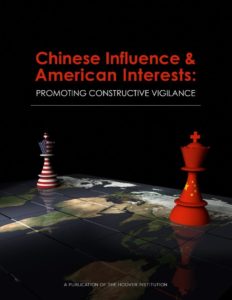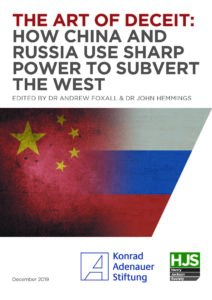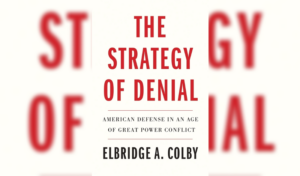
National Endowment for Democracy (NED)
Britain’s domestic security agency, MI5, sent an unusual alert on Thursday to lawmakers warning that an agent of the Chinese government was actively working to subvert the political processes of Parliament, The New York Times reports:
The notice from MI5 was published by several British news media outlets and its authenticity was confirmed by the Office of the Speaker of Parliament. It warned that a woman identified as Christine Ching Kui Lee had “acted covertly” through the United Front Work Department, a branch of the Chinese Communist Party devoted to furthering the government’s agenda in the world. The branch had sought to “cultivate relationships with influential figures in order to ensure the U.K. political landscape is favorable to the C.C.P’s agenda,” the notice said.
Ms. Lee had been involved in the “facilitation of financial donations to political parties,” lawmakers and potential candidates for public office in Britain and to “political entities” on behalf of foreign nationals, the statement said. She had “extensive engagement with individuals across the U.K. political spectrum,” and she had been involved in informal cross-party groups run by lawmakers known as All-Party Parliamentary Groups, it added. RTWT
“It is clear that the challenge from Beijing is increasing, and we need to defend our democracy against hostile activity,” tweeted Tom Tugendhat, chairman of the Foreign Affairs Select committee (below).
 Targets of Beijing’s influence operations are often under the mistaken impression that media, academic, and friendship organizations operate independently from the ruling Chinese Communist Party, but “[m]ost, if not all, of the Chinese entities that engage with their peers abroad unequivocally serve national party goals—either by following official or unofficial guidelines, or by avoiding taking positions that might violate [CCP] guidelines or jeopardize the regime’s goals,” according to the National Endowment for Democracy’s December 2017 report, Sharp Power: Rising Authoritarian Influence.
Targets of Beijing’s influence operations are often under the mistaken impression that media, academic, and friendship organizations operate independently from the ruling Chinese Communist Party, but “[m]ost, if not all, of the Chinese entities that engage with their peers abroad unequivocally serve national party goals—either by following official or unofficial guidelines, or by avoiding taking positions that might violate [CCP] guidelines or jeopardize the regime’s goals,” according to the National Endowment for Democracy’s December 2017 report, Sharp Power: Rising Authoritarian Influence.
The news appears to confirm the findings of a recent Hoover Institution report, which observed that “China’s influence activities have moved beyond their traditional United Front focus on diaspora communities to target a far broader range of sectors in Western societies, ranging from think tanks, universities, and media to state, local, and national government institutions. China seeks to promote views sympathetic to the Chinese Government, policies, society, and culture; suppress alternative views; and co-opt key American players to support China’s foreign policy goals and economic interests.”
While China and Russia often share the same narratives when challenging the West and its democracies, beneath the surface, Russia and China conduct information operations differently and pursue separate agendas that sometimes compete with one another, says a leading analyst. Understanding where Russia and China converge and diverge can reveal where the United States and its allies have opportunities to push back on two regimes that consistently take advantage of the asymmetries offered by the internet and social media, notes Non-Resident Fellow with the Alliance for Securing Democracy.
Counter messaging efforts might focus on two axes – issues and regions, he suggests:
 Geographically, several potential seams between Chinese and Russian influence might offer opportunities for Western messengers to the turn cracks between the Kremlin and CCP into chasms. Despite arising from communist roots, Russia and China today differ politically in their treatment of democracy. China seeks to coopt the concept of democracy , while Russia seeks to manage it; thus, their messaging often diverges in places like Africa and Latin America.
Geographically, several potential seams between Chinese and Russian influence might offer opportunities for Western messengers to the turn cracks between the Kremlin and CCP into chasms. Despite arising from communist roots, Russia and China today differ politically in their treatment of democracy. China seeks to coopt the concept of democracy , while Russia seeks to manage it; thus, their messaging often diverges in places like Africa and Latin America.
Throughout the Global South, Russian oligarchs and Chinese businesses currently compete in natural resource extraction. Thus, the West might use the on-the-ground exploitation of mining operations by both countries, combined with conflicting information and political manipulation related to local democracies, to inject targeted narratives advancing U.S. democracy promotion efforts while at the same time creating friction between the two authoritarian countries. RTWT
Transatlantic democratic solidarity against autocratic China is unlikely for various reasons, observers suggest.
Europe with its welter of languages, cultures and styles of governance doesn’t fall neatly into “black and white thinking,” says René Cuperus, a political columnist and senior fellow at the Clingendael International Institute.
“Europeans don’t like to think in terms of friend or foe, and what [Biden’s] summit of democracies is doing is more or less preparing a new Cold War between the democracies and authoritarianism,” Dr. Cuperus tells the Christian Science Monitor. “I don’t think that Europe wants to enter that frame. They are part of a multilateral family.”
Human rights and ideological issues can play an important role in contesting Beijing’s bid for hegemony, says Elbridge Colby, author of “The Strategy of Denial: American Defense in an Age of Great Power.
“We can see what kind of government China is—that it doesn’t respect people’s freedoms or human rights and is certainly not democratic. That tells us something about what a world dominated by the People’s Republic of China would look like,” he tells the City Journal.
“It also elicits our sympathy, across the political spectrum, that the people of Taiwan… have a vigorous democracy, unlike 50 years ago, when it was run by a military dictatorship. Those are all important things, and the fact that China also treats its ethnic minorities very poorly is something that could catalyze opposition.”
 Colby is one of the people who gave shape to the great-power competition paradigm. the Atlantic Council’s Damir Marusic observes.
Colby is one of the people who gave shape to the great-power competition paradigm. the Atlantic Council’s Damir Marusic observes.
“Strategies that insist we must democratize China or fundamentally weaken or collapse it would provoke far more cost and risk for Americans than is worthwhile,” Colby adds. “We might be better off with a democratic China—although that is not a given… But thoroughgoing pursuit of those goals would trigger China to take drastic measures, with consequences far graver than the stakes are worth for us,” he contends:
This doesn’t mean we should oppose a democratic China or swear off undermining the People’s Republic. To the contrary, we can and should support democratic government in China. Indeed, it already exists among the Chinese on Taiwan. And we will need to take steps to weaken China’s economic and military power to secure ourselves and our coalition partners. But we should only insist on these measures as needed to attain that favorable, stable, and enduring balance of power in Asia. We may hope for beyond that—for a free mainland China, for instance—but we should not force the issue.
Taking on the China challenge: The American Enterprise Institute hosts a conversation with Elbridge Colby, author of “The Strategy of Denial: American Defense in an Age of Great Power Conflict.” Thursday, January 20, 2022 | 3:00 PM to 4:00 PM ET RSVP
Our security services are rightly focussed on state threats the UK. It is clear that the challenge from Beijing is increasing and we need to defend our democracy against hostile activity. https://t.co/yiAB4LTcTJ
— Tom Tugendhat (@TomTugendhat) January 13, 2022







